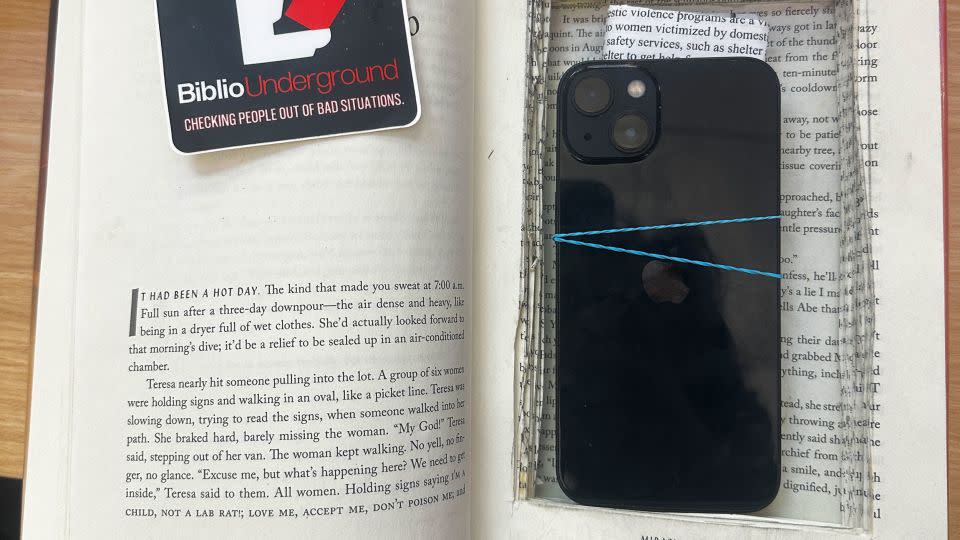A librarian in Massachusetts is hiding burner phones in books to help victims of domestic violence
Librarian Molly Riportella knows the power of books.
And as a survivor of domestic abuse, she understands that a phone can be a lifeline, or an intimidation device, for people in violent relationships.
So when a woman in an abusive relationship came to her two years ago, she knew exactly how to help.
Riportella slipped the woman a phone, programmed with numbers and email addresses for local shelters, links to free attorneys and other social services.
And the experience gave her an idea. She began carving hidden compartments in the pages of discarded books from her library in Westwood, Massachusetts, and filling each with a burner phone that’s been programmed with links and numbers for local resources.
The hidden phones, given out to women in abusive relationships, can be used to seek help — especially in situations where the partner is monitoring their phone calls and texts, Riportella said.
“I include resources for safety planning, pro bono legal action, how to get a restraining order — all the things that I had no idea how to do in my 20s when I was being abused, and I was scared to try to find out,” she told CNN.
Riportella, 36, puts the phone in silent mode to avoid drawing attention. She also scrapes off the library stamp and bar code, so the book is not traceable to any particular location.
She calls the hidden phones “Book-it-2-Freedom Kits,” or Bi2FKs. And to help distribute them, she’s created BiblioUnderground, a grassroots library and social justice movement to help people in abusive situations.
She encounters victims of domestic abuse at her library
As a librarian, Riportella said she frequently meets women seeking resources to escape abusive situations. So she tries to use her experience and resources to make their lives easier.
The woman who approached her in 2022 said that her boyfriend was going through her texts and social media messages on her phone, Riportella said.
Riportella had just switched phone plans, so she had a spare phone and decided to give it to the woman.
“I couldn’t communicate about things that were going on. And this really ended up being a lifeline for me to get out of an abusive relationship,” said the woman, 45, who lives in suburban Boston and asked not to be identified for safety reasons.

The woman told CNN her alleged abuser was monitoring her phone at the time and she had no other way to let her friends and family know what she was going through.
But thanks to Riportella, “I was able to completely shut down the phone I had through him and reach out to domestic abuse shelters,” she said. The woman said she has since left her boyfriend.
After Riportella gave the woman the phone, she had a eureka moment: why not provide a similar resource to others?
Elizabeth LaRosee, a community programs director who works with abused women in nearby Randolph, Massachusetts, said she heard about Riportella’s initiative last year and got a phone kit from her.
LaRosee said she gave the phone to an abused woman whose phone was tied to her husband’s account. The woman used the secret phone to access emergency housing and other services and has since left her husband, LaRosee said.
“Domestic violence survivors are oftentimes in situations where they do not have access to communication with the outside world,” LaRosee said. “They are basically held captive financially and are unable to get away from their abusers because of that.”
Abusers can use digital devices to control and intimidate
Statistics suggest Riportella has tackled a pervasive problem.
In the United States, one in four women have experienced “severe intimate partner” violence, according to the National Coalition Against Domestic Violence.
Advocacy groups have described the killing of US women by men they know as “a silent epidemic.”
Experts say many abusers use technology to control, stalk and intimidate their victims.
Erica Olsen, safety net senior director of the National Network to End Domestic Violence, told CNN that technology-facilitated abuse happens in 97% of intimate partner abuse cases.
“It’s important for survivors to connect with local victim service providers for thorough safety planning that looks at ways the survivor may rely on technology for communication,” she said.
Red flags for digital domestic abuse include when a partner dictates whom you can befriend on social media, uses a phone to track your whereabouts and looks through your phone to see who you’re communicating with, according to the National Domestic Violence Hotline.
Riportella said she faced similar controlling behavior about a decade ago. Her boyfriend at the time went through her phone to examine her messages, leaving her isolated and terrified of reaching out for help, she said.
“There’s a lot of stigma attached to being in a violent relationship … I felt very stupid because I didn’t know what to do, and I was afraid that if I did one thing there’d be consequences,” she said.

She said she eventually left her boyfriend and is now married to a supportive man.
Riportella said she understands that access to a phone is just part of the equation when it comes to escaping domestic violence.
“It’s not just a matter of having resources. It’s a matter of being able to overcome the mind trap that you’re in when you’re in a controlling relationship,” she said.
Riportella’s initiative has been slow to get underway, but she’s raising money via GoFundMe and through other sources, and hopes to expand her effort to serve more victims. Thanks to recent media attention, she said she’s hearing from abused women who contact her through the BiblioUnderground website.
Riportella said her long-term goal is to team up with shelters and other organizations to deliver phone kits directly to those in need.
“Right now it’s kind of an underground thing, but I’m trying to get more organized,” she said.
She hopes that access to secure phones will empower more women to stand up for themselves and share their stories of abuse with people they trust.
To encourage herself and others, she’s plastered empowering messages on the walls in her office.
One reads: “Nothing is to be feared. It’s only to be understood.”
For more CNN news and newsletters create an account at CNN.com

